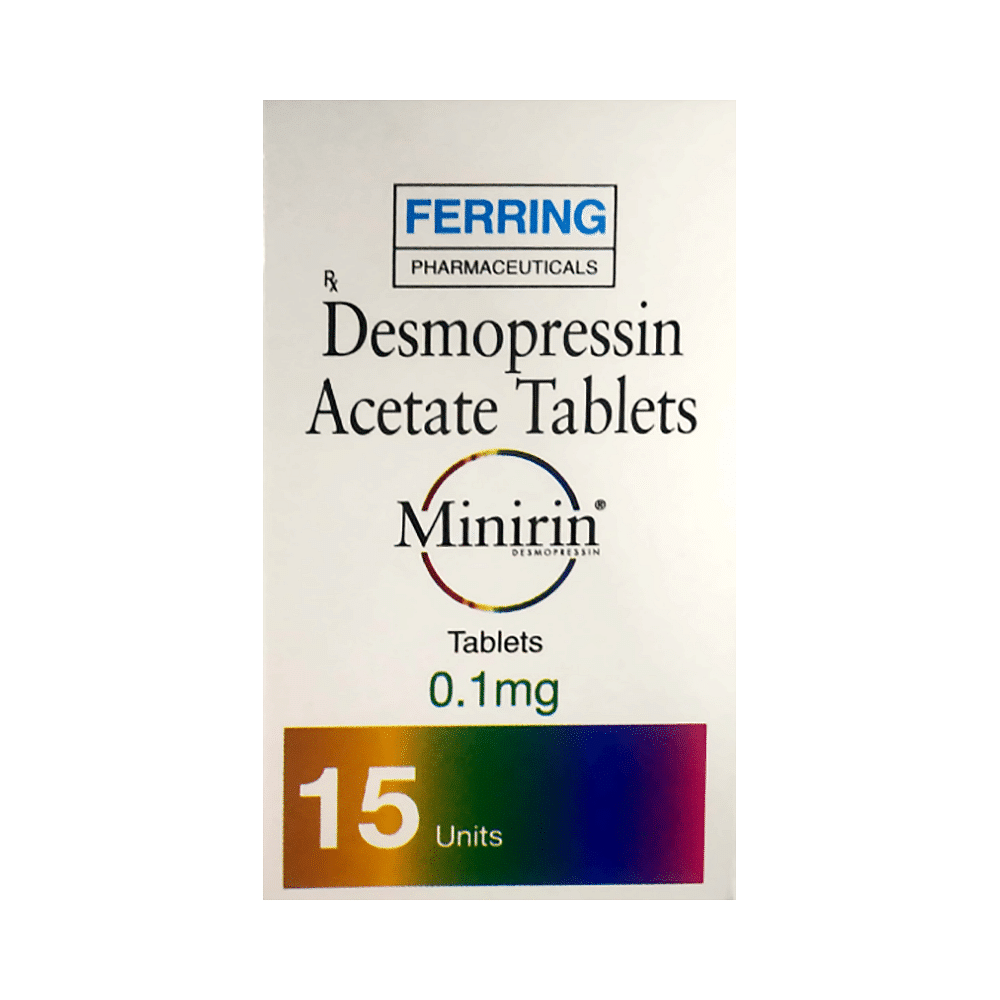
Minirin Melt 0.1mg Tablet
Manufacturer
Ferring Pharmaceuticals
Salt Composition
Desmopressin (0.1mg)
Key Information
Short Description
Minirin Melt 0.1mg Tablet is a medicine used in the treatment of diabetes insipidus and bed-wetting. It helps decrease the urge to urinate and helps resume a more normal lifestyle.
Dosage Form
Tablet
Introduction
Minirin Melt 0.1mg Tablet can be taken on an empty stomach or after food. Your doctor will decide the dose and how often you should take them. You should use it regularly to get the most benefit from the medicine. Do not stop using the medicine even if you feel better unless the doctor tells you so. Some common side effects of this medicine include headache, stomach pain, and nausea. Let your doctor know if any of these side effects do not go away or get worse. Before using this medicine, inform your doctor if you have any problems with your heart, liver, or kidneys. You should also tell your doctor all the other medicines you are taking. Your doctor may monitor your blood glucose regularly while on treatment with this medicine.
Directions for Use
Take this medicine in the dose and duration as advised by your doctor. Swallow it as a whole. Do not chew, crush or break it. Minirin Melt 0.1mg Tablet may be taken with or without food but it is better to take it at a fixed time.
Safety Information
Side Effects
No common side effects listed.
Alcohol Warning
It is unsafe to consume alcohol with Minirin Melt 0.1mg Tablet.
Breastfeeding Warning
Minirin Melt 0.1mg Tablet is safe to use during breastfeeding. Human studies suggest that the drug does not pass into the breastmilk in a significant amount and is not harmful to the baby.
Pregnancy Warning
Minirin Melt 0.1mg Tablet is generally considered safe to use during pregnancy. Animal studies have shown low or no adverse effects to the developing baby; however, there are limited human studies.
How it works
Minirin Melt 0.1mg Tablet is a synthetic form of vasopressin (natural hormone that balances water). It works by causing reabsorption of water from the kidneys which controls excessive thirst and urination in diabetes insipidus. It also helps decrease night-time urine production and bedwetting in children. In addition to these, it reduces bleeding episodes by promoting the release of blood clotting factors.
Quick Tips
You have been prescribed Minirin Melt 0.1mg Tablet for the treatment of diabetes insipidus and/or bed-wetting. Limit the amount of fluids you drink with this medication. Minirin Melt 0.1mg Tablet can cause low sodium levels in your body. Get regular blood tests done to monitor the levels. Inform your doctor if you develop an infection, fever, diarrhea, or vomiting. Talk to your doctor if you have sudden weight gain or swelling in your arms and legs that does not go away.
Related Medicines
Frequently asked questions
What precautions do I need to take while on Minirin Melt 0.1mg Tablet?
Take all instructions from your doctor carefully, as excessive water intake may lead to fluid overload. Avoid swallowing large amounts of water when swimming.
How long should I give my child Minirin Melt 0.1mg Tablet for bedwetting?
Minirin Melt 0.1mg Tablet is usually prescribed for 3 months for bedwetting. After 3 months, your doctor will stop the medication for a week to evaluate if further treatment is necessary.
Does Minirin Melt 0.1mg Tablet cure bedwetting?
No, Minirin Melt 0.1mg Tablet does not cure bedwetting but helps control it by replacing a hormone (vasopressin) that naturally balances water and salt levels in the body.
Does Minirin Melt 0.1mg Tablet make you gain weight?
Minirin Melt 0.1mg Tablet itself does not directly cause weight gain, but it may lead to fluid overload. Fluid overload can result in weight gain. If experiencing headaches, nausea, vomiting, restlessness, tiredness, loss of appetite, sleepiness, confusion and muscle cramps, contact your doctor immediately.
Is Minirin Melt 0.1mg Tablet a diuretic?
No, Minirin Melt 0.1mg Tablet is not a diuretic. It is a hormone that helps lower urine output in patients with diabetes insipidus and controls bedwetting in children by reducing the amount of urine produced by their kidneys.
How should Minirin Melt 0.1mg Tablet be taken?
Take Minirin Melt 0.1mg Tablet with a small amount of water, juice, or milk. If the child cannot swallow the whole tablet, crush or cut it before administering it to them. Sublingual tablets (melts) should be placed under the tongue and then melted before swallowing.



